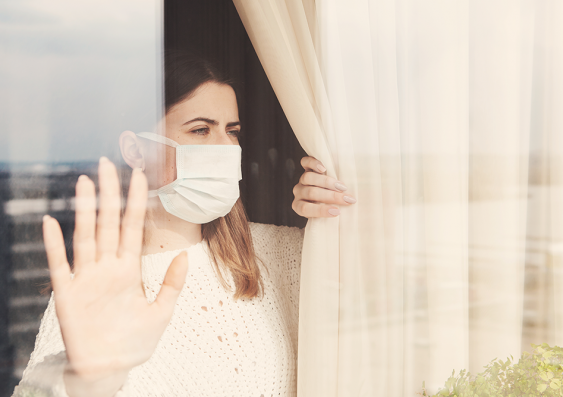COVID-19 anxiety: reframing the meaning of an experience can help us cope with stress
UNSW researchers share tips on ways to cope with anxiety and stress during COVID–19.
UNSW researchers share tips on ways to cope with anxiety and stress during COVID–19.

Cecilia Duong
UNSW News & Content
02 9065 1740
cecilia.duong@unsw.edu.au
As Australia continues to navigate the uncharted waters of the COVID–19 pandemic, many of us have been limited in the ways we deal with stress while in isolation.
While there may be some light at the end of the tunnel with some social distancing restrictions being lifted across the country, there is still anxiety and fear about when life will return back to normal.
Cognitive psychologist, Associate Professor Steven Most from UNSW Science, has conducted research on emotion regulation and says the way we respond emotionally to things changes our perception of it.
“Social pain isn’t in our imagination – when we feel social pain, the brain responds similarly to when we’re experiencing physical pain,” he says.
A/Prof Most also says the human desire for social connection is so strong that people are finding innovative ways to work around the social distancing restrictions we have.
“You see neighbourhoods in Italy gathered on their balconies singing, dancing and trying to find that human connection with the people around them.
“Humans are very social creatures; we look for social bonds in our everyday lives.”
So, when we find ourselves in a situation of uncertainty, how do we train the brain to adapt to this new way of living?
A/Prof Most says that when people are under stress or when they’re presented with an emotional situation, one way to deal with it is to change the meaning of the experience, which can in turn change the emotions towards it.
“This is called cognitive reappraisal and it’s a form of emotion regulation,” he says.
“Emotions don’t happen instantaneously; they unfold and are guided by the meaning we see in a situation.
“When we are able to shift perspective, it can change the emotions we feel. As a trivial example, recall the scene in the movie Mary Poppins, where she taught the kids to imagine that cleaning their room was a game, in order to make it less unpleasant.
“She is advocating a form of emotional regulation strategy where changing your understanding of the meaning of what you have to go through can change the emotional value of it.
“Cognitive reappraisal is a powerful way to change our emotional experience of much more serious situations as well.”
A/Prof Most also says that a number of astronauts have suggested that children, and perhaps adults, who have trouble coping with long-term isolation in confined spaces can compare how similar their experiences are.
“Astronauts often endure long periods of isolation as part of their training which would be similar to what many people are experiencing right now, to some degree.
“It’s a great idea to get kids to reappraise the situation by thinking about the parallels with the isolation that is often a part of astronaut–training – this can be a helpful way to change the emotional value of their current situation.”
Although we’ve already had weeks of restrictions and bans, it’s likely that there is still a lot of disruption to our daily lives coming up, and continued uncertainty.
UNSW Clinical Psychologist and Associate Professor Jill Newby at the Black Dog Institute says that some anxiety can be helpful, and research has shown that people who worry are more likely to engage in behaviours that help minimise the fear and help keep others safe such as frequent handwashing and cleaning.
However, if you do start to feel a bit overwhelmed, A/Prof Newby shares some helpful tips on managing anxiety around COVID–19:
Channel your anxiety into action
We feel more in control when we can plan and prepare for things.
“Rather than stewing about the situation we’re in, it’s important to get accurate information about COVID-19,” says A/Prof Newby.
“Make a plan about how your family and yourself will cope and then make preparations accordingly.
“Another way to do this is to learn about how your anxiety triggers can be a helpful way to know how to plan your days.”
Limit or avoid unhelpful media and information
Constantly hearing or reading anxiety-inducing stories further drives our own anxiety and stress, so the more we limit our exposure to those stories, the less frightening they become and the less of a chance we have to be distracted by them.
“Although it might be tempting to keep informed, or difficult to escape, limiting your exposure to media, news, and social media about coronavirus will help quell the panic,” says A/Prof Newby.
“There’s a lot of misinformation that’s spread through social media and it can be hard to tell what’s fact and fiction.
“So, limiting social media if you’re finding it is making you feel anxious or stressed, can be helpful.”
A/Prof Newby also says if you feel like you’re not coping, it’s ok to ask for help.
“You can seek professional support online, or remotely via phone or videoconferencing, if you are worried about going to a clinic.
“Importantly, be assured that for most people, the anxiety will be temporary, and will reduce over time, especially once the virus has been contained,” she says.
Find the full list of A/Prof Newby’s tips on the Black Dog Institute website or watch the webinar on coping with stress.